#and no spoilers about the plot can prepare you for how TERRIBLE those last 20 pages are. i knew what was going to happen step by step but
Text
So, I read Lightlark by Alex Aster, and of course it's bad! I was there when the drama surrounding this book first happened. I read crow-caller's review! I knew what I was getting into.
That being said, a part of me was half-convinced that the badness of this book was over hyped. There was no way such a perfect shit storm of bad writing could actually occur. Something had to have been over exaggerated.
And... nah. It's perfectly hyped. The plot is nonsensical. The characters are nothing. It's reads like the first draft where the author is just throwing spaghetti at the wall to just get through the ordeal, only to never revise in order to weave in foreshadowing or fix plot holes.
The really infuriating thing is that a once-a-century death game populated by the heirs of various kingdoms in a bid to prevent their kingdoms from being cursed is a really fun idea. From that description alone, I already got a billion plot and character ideas. Lightlark doesn't even do it's core concept well. Fuck, the core concept isn't even there. But the book is so infamous that no one can take the idea and do something with it without being known as a Lightlark ripoff.
Every time I read a bad book, I try to use it as an opportunity to reflect on my own writing and see where I can improve. Lightlark is an interesting case in that the prose isn't 100% terrible. Some of the imagery so pretty effective, and you can tell that Aster has written something before this. Where it's not effective is when Aster tried a motif or image and didn't succeed. I have more sympathy for this than I should since there are plenty of times I have gotten too over ambitious with my imagery and ended up writing a big stinker.
That's not to excuse the sun being a "yolky thing," though. That's a really bad piece of imagery turned into foreshadowing, and for that reason alone, it's used constantly. Ugh.
But the imagery isn't my real concern. It's the overwriting. Aster has no faith that the reader can remember anything about the plot or stakes, and will have Isla restate plot points and her motivations endlessly. It's really infuriating having to wade through it while trying to get through the plot.
But that form of overwriting is also something I do. On one hand, I do this because CTB chapters release weeks apart and things from two years ago suddenly become relevant; I lean towards trying to remind the readers of old information so that they don't get confused in the moment. On the other hand, a lot of this overwriting is evidence of me trying to work out a plot point as I am writing it; sometimes, something doesn't make sense to me until I've written out the evidence to support it.
I need to get better at editing these moments out so that scenes are less cluttered and readers are less infuriated.
But, yeah. I read Lightlark. It wasn't really worth my time, but it was still better than Sasha Alsberg's Breaking Time. 1 out of 5 stars.
#i wouldn't have understood the plot or lore without outside readings (reviews)#and no spoilers about the plot can prepare you for how TERRIBLE those last 20 pages are. i knew what was going to happen step by step but#I was STILL taken off guard by how bad it all was#me rambling#me reading#lightlark#lightlark by alex aster
22 notes
·
View notes
Text
Why the Fullbringer Arc is an important plot milestone - 2
the continuation of this post and I’m bak on my bullshit~ remember my brain will jump to things
also CFYOW spoilers
so part 2/?
key figures and themes of the arc
So last time I said that ppl disliked the majority of new characters because, as opposing to the ones we grew familiar with, the arc was differently paced and so we didn’t have time at large to form some sort of solid connection to them.
And here the magic happens, because we do not have time to get attached to the characters and they seem to be faded against the background of all the others.
But apart from COMPARISON Fullbringers are quite an independent unit that focuses not on how much reiatsu you have, but on skill
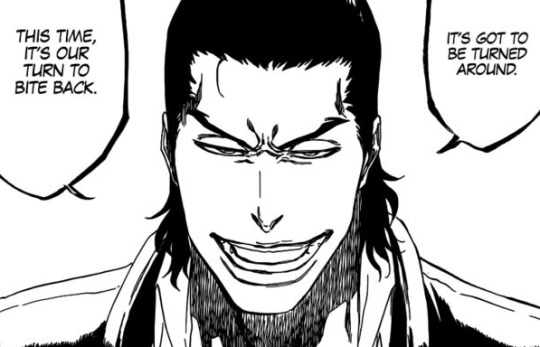
In the Can't fear your own world novel the origin of Fullbringer power is revealed and it’s shown how actually universally badass those powers are, take Tsukishima for example, who grows a tree in a second to ward off lightning, simply adding himself to the past. Atomic.
For living people even just getting close to the level of those with whom they fought (three captains and three leutenants) and not dying in the first moment (except u Giriko) is a great achievement. For people who are not Ichigo Kurosaki with a family tree rivaling GoT of course.
There is another important motive associated with fullbringers, which I mentioned above, and this is LONELINESS. And it's served so brilliantly that I'm going to die now.
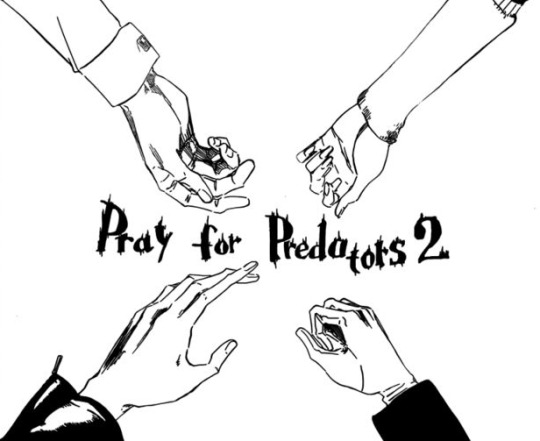
If you look and read carefully, it becomes clear that even the fullbringers gathered together are unusually, exasperately lonely. (See the cover? They reach out but never do truly connect) This is the curse of their power. This is their main weakness. This is their unusual humanity and kinship with the Hollows.
This is also why, but that’s my guess, their whole presentation is very lacking, to show how they fall out of everyday life and proper sozialising, so even we, as readers, cannot properly connect to them. Same reach out, but not hold symbolism. Or I am giving too much credit, we just don’t know?
Even the one who has assembled the whole group, Ginjo, is an even lonelier person who has terrible trust issues, who survived betrayal and persecution, and everything that he once believed in was set upside down. And even knowing what kind of person he is, fullbringers, driven by loneliness, followed him. (Though, we must admit, he weilds his words well and rolls +20 on persuation)

Because, although for a short time, he helped them to bear the burden of this loneliness.
Needless to say, the entire initial situation with OG fullbringers happened not only bc of some noble meddling, but also due to the fact that Ginjo gathered people to TAKE POWER FROM THEM SO THEY COULD LIVE A NORMAL LIFE
Ironically enough, each Fullbringer posesses a piece of SOUL KING, which is the source of their power and lures Hollows to pregnant mothers, which is such an important piece of information it makes me mad it was only explained in CFYOW.
Although it is understandable why Kubo chose not to focus on it during the arc. My take is he planned to show the importance of Fullbringers and their origins during TYBW, but we all know it didn’t happen.
Another common theme that follows from the previous two is PTSD, which unites the characters and key figures of the arc, and the paths of experiencing trauma constitute another conflict, where Ichigo overcomes it through friends and the return of strength and motivation, as opposed to Ginjo, who choses destuctive way to handle his own trauma.
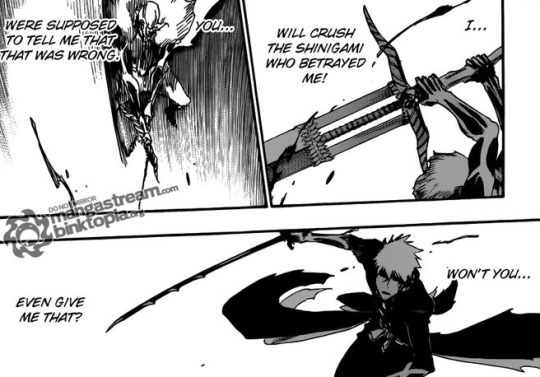
In short flashbacks shown during “Pray for Predators” chapters, we can also clearly see PSTD practically in every person’s past. Each of Fullbringers go about it differenly, most proactive being probably Riruka and most reactive being Tsukishima and Ginjo. Which is also symbolically shown that people, who can go own with their lives and finally integrate into society stay alive. Those, who cannot, go to SS and are set into new path by more drastic measures.
I will surely attribute to the pluses how Kubo shows Ichigo's PTSD, literally in 3-4 chapters showing how he cannot, like Remarque's hero, settle in peacetime, because he constantly catches triggers, for example with his substitute badge.

Through Ichigo’s thoughts is shown how he merged with his position as a substitute shinigami and constantly thinks in categories that are not very applicable to his normal life, which he seemed to have dreamed of for 16 years And now he actually got it, but absolutely does not know what to do with it.
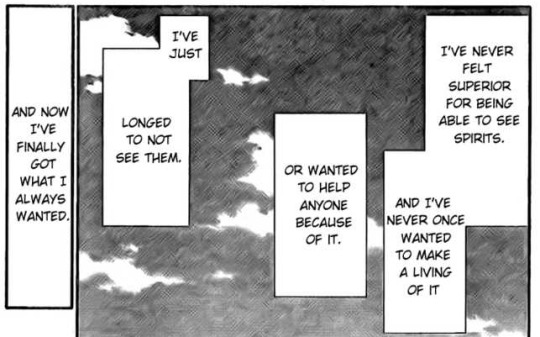
Kubo skillfully fuels PTSD and Ichigo's anxiety which is why he is being swayed by Ginjo's words correctly spoken at the right time.
Example: Karin speaks of his brother, they say he always fought to protect Ginjo fuels Ichigo’s doubt , saying he must act to protect his family
Accordingly, the theme approaches the climax for a push into the plot at the time of the attack on Ishida, Ichigo gets a punch in the gut twice: first from Ishida himself, who, with his unwillingness to tell things, pokes Ichigo into his helplessness and excludes him from the circle of trust, which IS the last blow
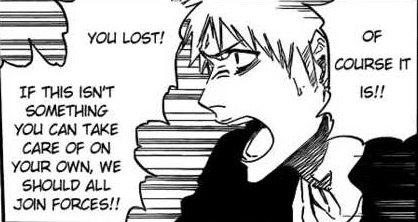
And then from Ishida's father, who by his behavior shows that Ichigo's efficiency now amounts to zero, so much so that he cannot even protect Orihime while she walks home, which is why he runs away in frustrated feelings, realizing the message. So this intro is absolutely veritable and ingenious.
And so that you understand how desperate Ichigo is, if not yet, then here is a panel where FATTEST visual forshadowing happens. And here is an absolutely genius moment to understand that Ichigo is not a child but a teenager with all that it implies
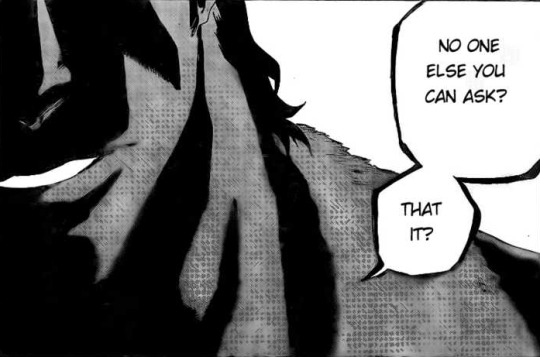
He may be battle-hardened, but this is a 17-year-old living boy with trust issues, and if we remember that through his manager's lips we are given a direct hint that Ichigo is still immature in a way, so the meaning of this arc as a stage of Ishigo's psychological maturation becomes clearer.
Just look at the face he has when Ginjo promises to return his powers (not to mention the hysterics after that) Is this a healthy person's face?

And here my hands are literally itching to start talking about Ginjo, because to give an antihero who, in addition, will have a much closer dynamics with Ichi than Urahara, plus for the duration of the arc will act as a mentor and father figure, this is just genius. Don’t @ me.
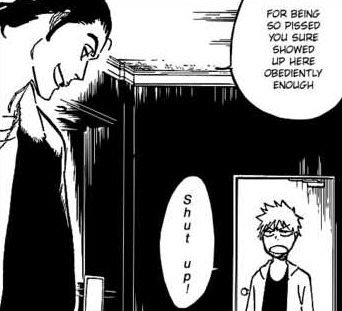
But the next plus, which will then bring us further, and this is THE Forshadowing
Everywhere, just everywhere, starting from the very first pages.

And Kubo still confuses us in the course of the narrative, but my god, when you re-read, Easter eggs are crammed almost in every chapter and I think its beautiful. Both verbal (Ginjo is such a bad actor that he has to change his memory badumts) and visual

The plus that I mentioned earlier is 100% more lively dynamics between Ginjo and Ichi, because both are people and in fact, there is much more than it may seem at first, that brings both together. And the friendly connection that they establish with each other in this arc still not 100% false placeholder. (Which is easily spotted by the way Ginjo adresses Ichigo through the arc especially last chapters).
And at the same time, they are in many ways the antonyms of each other, in age, color scheme, design, even names and also in what gives them motivation, in how they react to this or that event. For example, Ichigo is quite an emotional guy and puts his soul into everything, so to speak, then Ginjo, for example


Plus, the latter is not only skillful manipulator, but also embittered. And through such contrast, with generally the same input data, Kubo shows us that there is always a different path, leading to the topic choice, and where each specific one can lead a character.
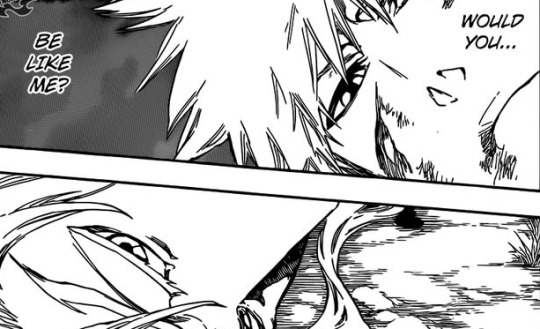

Which absolutely doesn’t stop Ichigo from familirizing himself right off the bat and the two of them have comedy gold moments from the start. It is more lively, than being set against 300+ y.o. Urahara (whom I love as a character).

And, cross my heart Isshin is a great character, but he’s got that father of the year award, and Urahara can only give like a little itsy bitsy of information at a time only if it benefits him or a bigger picture, so the mentor’s role goes to Ginjo, which is well earned as he is technically the First Substitute.
Ginjo is a mentor, a guide, and the main antagonist of the arc, which in itself is an unexpected and interesting combination within the framework of Bleach. Here is a living example, in the moment of training he can go so far as to help Ichigo overcome his psychological barrier by simply and cruelly breaking him.
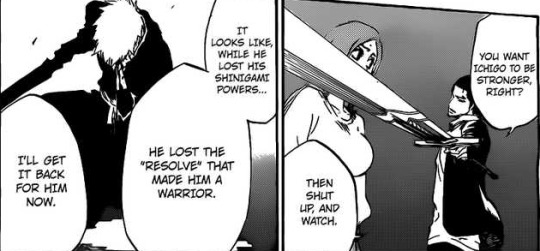
Which he does in the most painful way, through the trauma and inability of Ichigo to protect his loved ones. And from the reaction of the latter, childish and naive, his immaturity can be clearly seen (see the previous points). Although we do not know this yet, Ginjo is constantly trying to teach Ichigo one lesson that he himself learned the hard way.

Combining this with such an important praise for a teenager and faith in Ighigo’s powers, which Ichigo was deprived of for 17 months as soon as he lost his powers as a shinigami ( all relatives are trying to isolate him from this, no one believes that he can and is able to stand up for him). This is another plus of the arc, namely the whole depth of the betrayal that Ichigo experiences when the cards are revealed.
Maybe the quincy arc would go completely differently, if Ichigo felt Ishida's betrayal or reacted to the truth about his mother in a different way. Did Ginjo not temper/prepare Ichigo in the way he did, did he involuntary not strengthen Ichi internally... Who knows how Bleach would end in general.
This is to the question of the importance of this arc yes
P.S Strengthening the body also benefited Ichigo.Friendly reminder that he fights in his physical body for the entire arc except the end.

And the training episode immediately appears in a different light, right?
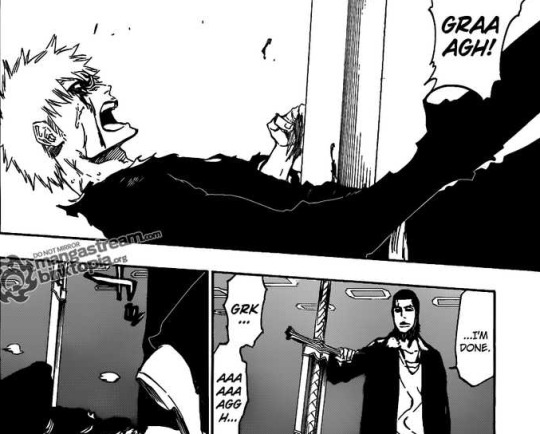
And in my next hot take I will focus on another really important thing which is salvation and my own bitterness of why didn’t Kubo explore the whole SS thing and now we have to fee ourselves
#bleach#bleach meta#ginjo kugo#ichigo kurosaki#fullbringers#my fingers are tired#omg i can't shut up#look at all the potential we could have#look at ginjo#this is for free
15 notes
·
View notes
Text
Watchmen: My favorite show of 2019
Now that I’ve watched HBO’s Watchmen in its entirety, I can safely say that it is by far my favorite show I’ve seen this year. The more I think about it though, the less it seems to offer a coherent statement about vigilantism, power and violence the way the original graphic novel did. I don’t think this makes it any less clever, bold or satisfying to watch, but Watchmen is more interested in playing with the weight and drama of themes than actually expressing a clear, useful thesis about them.
The show is a sequel to the graphic novel, taking place in 2019, when the fallout from the 1987 story finally comes home to roost.
To give you some more context, I’ll be talking about Alan Moore’s 1986-1987 maxiseries of comics first, and then comparing it to the new television series narratively. In terms of acting and production values, I’d say that the show is great across the board, although your mileage may vary. This is doubly true of its narrative: I’m curious if the show is too confusing for people who’ve never read the comic, and the show doesn’t show a lot of reverence for the characters of the original. In my opinion, this is for the best and actually completely in the spirit of Alan Moore’s work. From here on out, There be Spoilers for the comic, movie and the tv series.
Watchmen (1987) by Alan Moore and Dave Gibbons is by far my absolute favorite superhero comic. It is the only graphic novel to be named as one of Time’s 100 best novels of the twentieth century. It’s certainly not true that it is the only graphic novel that deserves that kind of honor, but it is not on that list for bad reasons. This post would be too long if I listed all of Watchmen’s many achievements, so I will just say this: Watchmen investigates how the existence of masked vigilantes and superheroes would change the real world, and its answer is not positive. No matter how you slice it, in order to inflict violence on strangers or save the world based purely on your own moral compass, you have to be either hopelessly naive or narcissistic, sadistic, fascistic, fetishist, manic, or untethered from human experience in one way or the other. However you imagine them, superheroes escalate danger. They are not cooperative or peace-loving by their nature, the comic says. ‘Superheroes’ will do terrible things in the name of ‘saving the world’ or ‘doing the right thing’. In this sense, the book is thoroughly anti-utopian but also anti-superhero, and it commits to this by depicting all of its ‘protagonists’ as deeply flawed, ultimately dangerous or inept people.
In terms of plot, the big twist that effects the show is that the smartest man in the world, the vigilante Ozymandias, predicts that nuclear armageddon is inevitable unless he convinces the global superpowers that there is a massive alien threat, making their feuds appear petty and risky by comparison. He literally kills millions of people with a genetically engineered giant monster that he teleports to New York, not including the dozens of murders to prepare the ground and cover up this fact. The fear that more monsters like this could appear prevents nuclear war at the last second, but another vigilante named Rorshach figured out Ozymandias’ plan and wanted to expose it, which would undo its intended peacemaking effect. He was killed, but his notes survived.
In the end, the only vigilante with actual superpowers, Dr. Manhattan, is so far removed from human experience because of his godlike powers and his nonlinear perception of time, that he seems to retreat from Earth itself, expressing a desire to create life elsewhere.
This is the backdrop against which Watchmen (2019) frames itself: what would that alternate history look like about 20 years later? But instead of focusing on the evils that vigilantism and superpowers would create, this sequel puts race and policing at the core of its narrative. The main protagonists: Angela Abar, Will Reeves, Laurie Blake and Wade Tillman are all cops and all of them are at one point in their lives masked vigilantes. They are also pitted against white supremacist terrorists, and the show depicts them as regularly violating the constitutional rights of suspects and killing lots of people in justifiable situations. The show depicts both cops and civilians in both real and historical race riots.
But the more I think about it, the less I can identify a coherent thesis about the origins or nature of racism or the morality of extra-judicial violence. It seems to say ‘violating a person’s human rights is alright as long as they’re racist’, and I mean, I can’t be too mad about that, but it also implies that the cops are basically good, that it is possible to root out specific racist conspiracies and that’s all that’s needed to set things right. There’s a definite assumption that most of the time, we can just trust cops to have integrity. The show rarely frames unmitigated violence as a systemic issue; even when the government is implicated. The protagonists are also relatable and sympathetic, and their victory against the white supremacist conspiracy is without any real moral complications or ironic personal costs. This show, unlike its source material, is pro-vigilante. Or at most neutral on the subject.
Its message about racism is more straightforward, but also a little hollow. Racist violence is shown viscerally, but also roundly condemed, ridiculed, and avenged by the protagonists. But that’s really as deep as it goes. All racists in this show are openly and stereotypically Southern whites. There is very little exploration or covert or insidious racism: there is a clear divide between literal neo-KKK types and antiracist avengers, with little ambiguity in between. We are not really shown what drives racists to be racist. The most motivation racists are given is a resentment over two attempts at improving the world: Reparations for the Tulsa Massacre, and the aforementioned plot to stop the Cold War by faking extradimensional invasion. Not that I’m begging for a humane portrayal of racist terrorists, but it does make it extremely easy for actual, less obvious white supremacists to ignore any criticism because ‘at least they’re not like the Seventh Kavalery’. It in short, doesn’t give viewers any special insight into racism and how to deal with it in the real world.
What Watchmen does do beautifully is representation. The first masked vigilante, Hooded Justice, who in the comic was a clear reference to a Klansman, is reimagined as the victim of a threatened lynching, who fights his attackers still wearing the noose and hood they put on him. He then pretends to be white to gain the support and cover he needs to be a vigilante. This man, Will Reeves, named himself after his childhood hero, the historical inspiration for the Lone Ranger, Bass Reeves. As a child, he was smuggled out from the Bombing of Tulsa in the trunk of a carriage, much like Moses or Superman. We later discover that HJ is bisexual and is essentially strung along for years by the media-savvy Captain Metropolis for publicity purposes and sex, and ends up desillusioned by his white allies. We also learn that Angela Abar, the de facto main character, is in fact his granddaughter, and she becomes involved in his decades-spanning plans to root out the racist conspiracy that the plot revolves around.
Perhaps even more interesting is the decision to integrate Doctor Manhattan into this sequel as a jewish and a black man. Rather than simply recasting the part, the show frames the revelation in a way that Dr. Manhattan might experience it: out of order, but also clearly telegraphed. The show uses this to characterize Dr. Manhattan as someone whose decisions do not adhere to standard causality. Why does he start to woo Angela Abar in the first place? Because from his perspective, he’s always been in love with her. Just like nothing ever ends, it doesn’t really begin from his perspective either. One day, he walks into A Bar and starts explaining to Angela Abar that they will be in a relationship for ten years, which wil then end in tragedy. While she is understandably skeptical, Regina King and Yahya Abdul-Mateen II really manage to sell both the frustrating absurdity and the transcendant romance of this idea. In the end, Osterman chooses to take the shape of a dead man based purely on the fact that Angela is most attracted to, and goes to great lengths to lose is powers and become human again, as a black man named Calvin Abar, who we first meet as Angela’s charming stay-at-home husband and father to their adopted children. The fact that he is Dr. Manhattan all along is revealed to us in my favorite sequence in the whole show. We, the audience, fall in love with both the husband as well as the God, Jon Osterman, as both are vulnerable and honest about who they are. Even though everyone knows it can’t last. These scenes are both heartbreaking and beautiful, and are foreshadowed masterfully from the beginning. This is what I mean when I say the show is clever.
The dialogue is witty and the cinematography, editing and plotting do a subtle job of worldbuilding. There are very few exposition dumps and characters rarely do or say things just to help the plot along; they are always driven by their own motivations rather than those the viewer might prefer in their hurry to learn more.
As a result, characters feel smart and their personalities and relationships develop more naturally. From Jeremy Irons’ Ozymandias to Hong Chau’s Lady Trieu to Jean Smart’s Laurie Blake, they all come across as clearly defined assholes with a charismatic competence.
The world and its history also unfold at their own pace. This can be confusing in the first couple of episodes. It isn’t explained why cops wear masks, what ‘Redfordations’ are, or why squids rain from the sky often enough that a siren goes off whenever it happens. Instead, viewers piece a lot of it together from context. The details make it feel very believable. It makes me feel like I’m discovering an alternate history the way a lost time traveler might.
In the end, it is not the themes that make this version of Watchmen so enjoyable. Its the intricate details of its world and the interactions between its characters that make Watchmen 2019 so fun to watch. And as far as on the nose messages go, ‘vaporize as many racists as possible‘ isn’t that bad.
#Watchmen 2019#Watchmen HBO#reviews#fave shows#fave show of 2019#Dr. Manhattan#Angela Abar#Hooded Justice#Cal Abar
8 notes
·
View notes
Text
Crazy Ex-Girlfriend season three full review
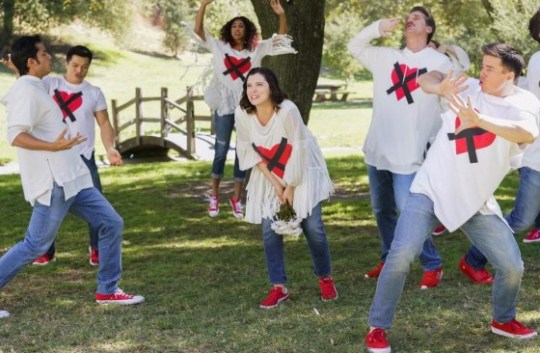
How many episodes pass the Bechdel test?
100% (thirteen of thirteen).
What is the average percentage per episode of female characters with names and lines?
41.16%
How many episodes have a cast that is at least 40% female?
Seven, so just over half. Three of those are 50%+.
How many episodes have a cast that is less than 20% female?
Zero.
How many female characters (with names and lines) are there?
Twenty-four. Thirteen who appeared in more than one episode, five who appeared in at least half the episodes, and two who appeared in every episode.
How many male characters (with names and lines) are there?
Thirty-nine. Eighteen who appeared in more than one episode, seven who appeared in at least half the episodes, and one who appeared in every episode.
Positive Content Status:
Not nearly as good as you might expect or hope. As with previous seasons, the show’s most impressive content is not the feminist stuff at all, and on the feminist front it feels sometimes as if the show spends more time denouncing different aspects of the feminist movement as ‘the wrong kind of feminism’ than it does declaring and upholding the aspects it does approve. I tend to feel that it spends time talking the talk on women’s issues, but doesn’t often get up to walk the walk (average rating of 3).
General Season Quality:
Easily better than the previous two seasons, despite a deflated ending. It takes a much more focused approach to its storytelling in the beginning of the season, in a manner which briskly becomes refreshingly confronting and leads in to a powerful middle. Unfortunately, it never sustains quality for very long, and overall the show still suffers for being too easily distracted. It’s not infuriating, but it can be frustrating.
MORE INFO (and potential spoilers) under the cut:

Ok, let me explain something about myself first, something I’ve mentioned in other (non-Crazy Ex) posts which have gone live long before this one will, but for anyone who missed it in any of those other places, here it is: I am, right now, pregnant. In fact, I am pregnant with a child conceived non-traditionally with a gay friend of mine, and as such, Darryl’s non-traditional quest for biological parenthood in this season struck a very personal chord (though, unlike Darryl, I used the phone-a-friend option as my first choice, not a fallback. Would recommend, if it’s ever relevant to your life). I bring all of this up because I can categorically declare that there are certain plot threads that you absolutely will NOT have the same reaction to if you don’t have that very personal chord being struck, and even moreso if that chord is relevant to your life right now, rather than being something that you’ve experienced in the past but has since slipped from the forefront of your attention. Thus, when I talked about feeling like the emphasis was in all the wrong places for Darryl’s part of the narrative, and expressed irritation with Heather’s pregnancy and birth? I sure ain’t mad about it for no reason. I am extremely, extremely aware of what those processes are actually like right the heck now.
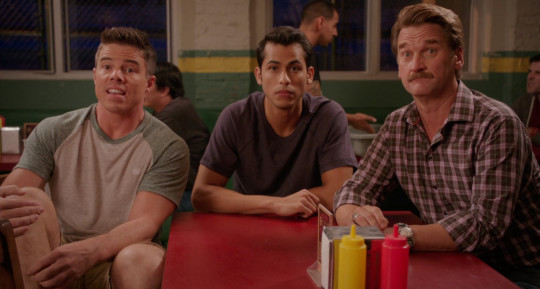
I’m not going to linger on all the details, but I am particularly annoyed at the writers for dropping the ball on the pregnancy/birth part, specifically because it’s something which is so often badly dramatised in tv and film already, and the writers not only know that, they openly reference it as if they’re somehow doing better. The same way that medical professionals sometimes find it too frustrating to watch hospital dramas because of all their inaccuracies, or someone in law enforcement might cringe their way through all the egregious breaches in procedure in a cop show, there’s always a significant risk that anything depicted in fiction will make you want to tear your hair out over the way the plot warps or disregards reality that is pertinent to your life, either through a lack of proper research or understanding of the subject matter, or a conscious choice to prioritise desired storytelling beats/developments over actual logic and realism. Suffice to say there are a LOT of concessions Crazy Ex-Girlfriend asked me to make to their storytelling with this little subplot, some of which most people who have never been pregnant wouldn’t notice, and yes, some of which I would probably dismiss if I were not in the midst of the reality right now. I’m someone who has been present at actual births before and has been raised with an above-average understanding of what’s involved, so I’m used to gritting my teeth and hoping to just not be too annoyed by the way pregnancy and birth is typically depicted on screen. The fact that I am currently immersed in the reality of preparing to give birth makes me less forgiving of fictional contrivances, yes, but in the case of this show’s approach, it’s also more than that: it’s the fact that this show actively promotes itself as a feminist text. And if you’re gonna do that, and criticise the way other things (”written by men!”) depict labour, but then you also choose not to include any education/empowerment of your pregnant character, rattle off a variety of (uneducated, disempowered) cliches anyway, and then handwave it all with ‘nevermind, she just got an epidural!’ as if that ‘solves’ the difficulties of birth (and post-birth recovery, for that matter), frankly that’s just...a really unimpressive failure of feminist storytelling. Congratulations, you neglected the subject completely, at the same time as actively claiming your intent to do better than all that written-by-men schlock out there! What a tiresome charade this turned out to be.
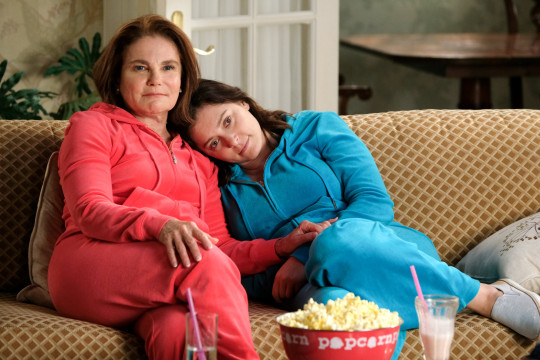
Setting that aside though (difficult for me, as I am...very preoccupied with it), there was actually a good lot of things to like about this season, even if I do still feel that I ultimately have more criticisms than I do praise. Having Rebecca actually reach crisis point in the form of a suicide attempt, and consequently getting a diagnosis for her mental disorder and finally being able to move forward in learning to live a balanced life with BPD? Frankly, it’s not a move that I anticipated, and if you’d asked me where I thought Rebecca’s mental health plot was heading, I probably would have just shrugged it off as an unfocused thread where the ultimate goal was just ‘figure out how to be happy on your own terms instead of defining happiness through someone else’ (which is solid advice, but generalised advice, not something that would require the show to commit to a genuine mental illness). Acknowledging that Rebecca’s behaviour comes from a more distinct source than just the nebulous idea of being ‘crazy’ is a vitally important development, and it ushered in some of the best storytelling the show has offered thus far, at least when the plot maintained steady focus and made an effort to be responsible and mature in its exploration of the issue. As ever, there were still times when the show used Rebecca’s mental state for comic relief in a manner which made me uncomfortable, and times when I couldn’t interpret the intentions of the narrative - I have come to the conclusion that this show and I are on completely different wavelengths, which makes us a bad match, regardless of any elements which I do appreciate.
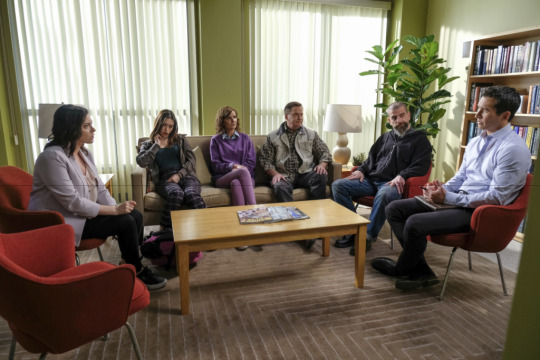
On the subject of things I appreciate, I’m going to discuss the true character highlight of the show, someone I wanted to talk about after last season, not realising that if I held off until this review instead, he was gonna wind up so terribly underused in the meantime that it’s almost weird that he’s still technically part of the main cast at this point: Josh Chan. Josh Chan is...kinda the most believable part of this show, both in the bumbling good-natured balance of the character himself, and in other character’s feelings about him. Being able to buy the idea that someone would give up their whole life as they knew it to chase after this guy is kinda important to selling the concept of the show from the outset, and honestly, Josh Chan is the only time I’ve ever seen a central male love interest for whom the hype seemed to make sense. Is he perfect? Not by a long shot, but that’s fine because ‘perfection’ is as conditional as it is unattainable. The problem with male love interests, often, is that they’re written by heterosexual men who treat the character as some kind of masculine wish-fulfillment, a combination of ‘guy I wish I could be’ and ‘guy I think women should want (me)’. Josh Chan is a great example of a love interest written by women for women: he displays positive masculine-coded traits (protective, physically capable), while rejecting negative, toxic-masculine elements (aggression, possessiveness), and he embraces key ‘feminine’ traits (non-threatening, kind, soft, emotionally expressive, family-oriented), while his flaws are unobtrusive and potentially even endearing (the main one is that he’s quite stupid, which is something a lot of straight women will happily admit to liking (at least in theory), and other traits such as Josh’s childish streak can be a source of joy under some circumstances, as well as being something Josh mostly keeps a hold on so that it doesn’t become a burden to his partners). Also, it would be remiss of me to neglect to mention how refreshing and meaningful it is to have an Asian male love interest. I really enjoy not being bored to death by Josh Chan, and I am annoyed at how little of him we got this season while we wasted time with that generic slice of white bread, Nathaniel. Bring back the Chan plots, season four. Do it for me.

#Crazy Ex-Girlfriend#Crazy Ex-Girlfriend season three#Bechdel Test#female representation#full season review#Crazy Exgirlfriend
2 notes
·
View notes
Text
The Very Best of Supernatural

Supernatural was just renewed for a fifteenth season. Which is insane. Even more disturbing is the fact that I've been reviewing this show for fourteen years, and it just... won't... end. Looking back over my earliest reviews, it's funny that I kept fretting about cancellation. Who knew?
The 300th episode will air this Thursday, February 7. In observance of this major event, six Agents of Doux compiled lists of their favorite Supernatural episodes, and I tallied our choices and made a final top ten. Okay, eleven, because there was a tie in there, but it was really hard to bring it down to eleven, let me tell you. Our list of honorable mentions went from here and out the door.
So here they are. Please note that if you haven't seen all or most of the series, there will inevitably be spoilers.
11. "A Very Supernatural Christmas" (season 3, episode 8)
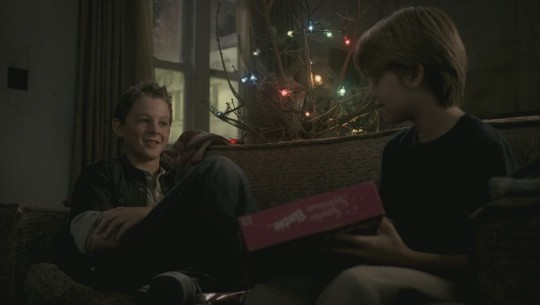
Christmas arrives smack dab in the middle of Dean’s last year on Earth, or so we believed at the time. Sam, knowing he will soon be left to carry on after his brother’s death, has no desire to celebrate which is at odds with Dean’s intention to collect as many happy memories as he can before the end.
This marks Supernatural’s first holiday episode with a marriage of gruesomeness, absurdity, and bittersweetness we'd already grown to love – from a blood-soaked Santa dragging a father up the chimney in front of his son, to bridge-playing pagan gods threatening Dean with the swear jar while preparing him and Sam for ritual sacrifice, all ending with the brother’s exchanging heartfelt gifts from a neighborhood Gas Mart as Baby looks on. The pièce de résistance – learning Dean’s amulet was a Christmas gift from a young Sam in unsaid acknowledgment that Dean was often more of a parent to Sam than John was. And no, I’m still not over Dean throwing it away. – Shari
10. "In the Beginning" (season 4, episode 3)
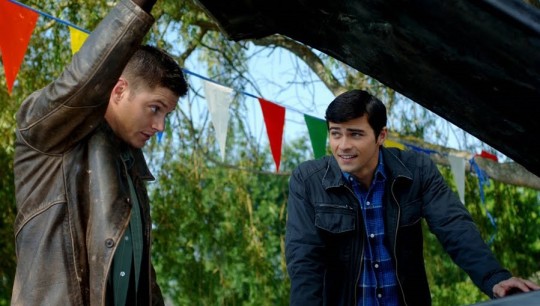
A remarkably funny but ultimately tragic tribute to Back to the Future, Dean is sent back in time by Castiel and interacts with his young parents. He discovers that his mother and grandparents were hunters, and that Mary essentially sold as-yet-unborn Sam's future to the Yellow-Eyed Demon in exchange for John's life.
"In the Beginning" is a perfect example of the attention the Supernatural writers pay to continuity and series mythology, since it explained Mary's actions in the pilot episode on the night that she died. Plus it features, in my opinion, one of the most touching moments in the entire series. It's when young Mary tells Dean, not knowing that he is her son, "You know the worst thing I can think of? The very worst thing? It's for my children to be raised into this, like I was." It choked me up when it first aired. It still does. – Billie Doux
9. "Baby" (season 11, episode 4)
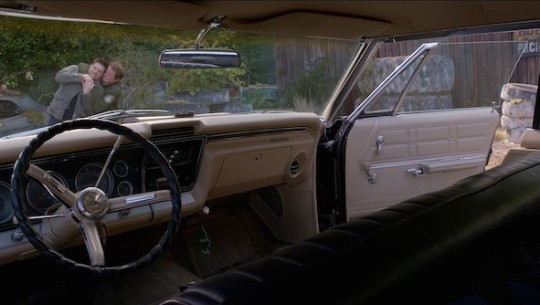
The longevity of this series has allowed the writers to experiment and take chances, which often gives us exceptional episodes. This is one of them.
The Impala is home for the Winchesters, a legacy from their father. That car is not just in nearly every episode; it's also the setting of many of the most important brother scenes in the series. "Baby" gave us an entire episode from the car's point of view. I'm going to crib from my initial review: "This episode was such a love letter to the fans. It was the world of the Winchesters, but not what we usually see on the show. It was what happens in between and around what we usually see." The camera angles, the head in the cooler, the windshield wipers, the valet parking, Castiel on the cell phone, the brothers singing "Night Moves" together, it was different from all the others but a practically perfect episode. – Billie Doux
8. "Fan Fiction" (season 10, episode 5)

Supernatural's 100th episode ("Point of No Return") was good, but arc-plot heavy. Coming in the middle of a very serious storyline, it's dramatic and moves the plot along. But its 200th, "Fan Fiction," is a complete contrast and a sheer joy from start to finish. An episode centred around a girls' school putting on a musical they wrote themselves, based on the first five years of Supernatural, sounds like a terrible idea. And yet, writer Robbie Thompson makes it work. The episode also features great performances from the young actresses, but it's the numerous call backs in jokes and the way the episode revisits old favourites with a twist that make it one of the show's most re-watchable episodes. – Juliette
7. "Swan Song" (season 5, episode 22)

Endings are hard, as Chuck would say. You have to balance expectation with payoff, death and survival and a resolution that feels satisfying. For Supernatural, this was supposed to be it, the show's literal swan song, as planned out by Kripke. It was sad and painful. If this had been the ending, it would’ve left us with Dean trying to live on after losing his brother to spend eternity with the Devil in hell, and that’s pretty brutal. Of course, framing the story around Baby, and making the car one of the most important things in the universe, was perfect. The only reason we didn’t end with Sam in the box is because of season renewal, leaving us with more questions than answers. Including what happened to Chuck. – J.D. Balthazar
6. “Dark Side of the Moon” (season 5, episode 16)
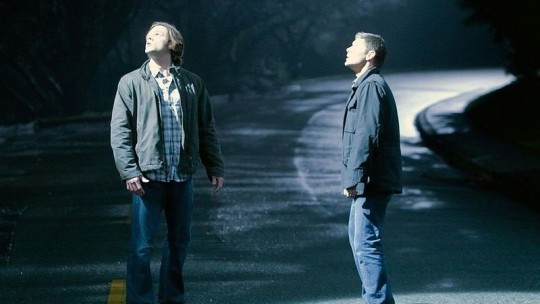
This episode has always been a huge favorite of mine. The opening scene where Dean and younger Sam set off fireworks to "Knock Knock Knocking on Heaven's Door" was so gorgeous that it gave me goosebumps.
How many shows would dare to send their two main characters to Heaven? And show that Heaven as somewhat creepy? What I found poignant was that the brothers' choice of happy memories mostly don't include each other. I've often thought that a perfect end to the series would be the two of them in a Heaven that finally included each other, with everything that ever divided them fully resolved. – Billie Doux
5. "Wishful Thinking" (season 4, episode 8)
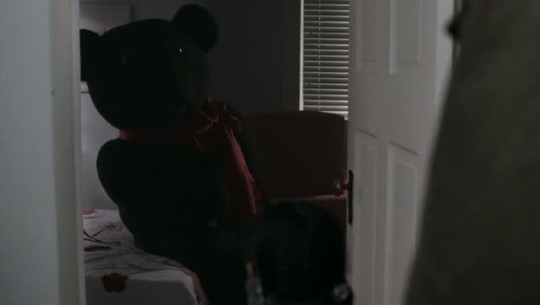
Absolutely one of their best comical episodes, from the "deep woods Duchovny" line to the suicidal teddy bear. Although, of course, what makes funny Supernatural episodes work is that there is always an element of underlying seriousness or tragedy. Here, it was the acknowledgement that using magic to make someone love you is evil. This was also the episode where Dean told Sam the truth about his experiences in Hell. – Billie Doux
4. "Don't Call Me Shurley" (season 11, episode 20)

Supernatural has a warm heart and it's often hilarious, but it's not often happy. Usually, the joy of watching Supernatural comes at least partly from knowing that whatever's going on in your own life, Sam and Dean surely have it worse. But "Don't Call Me Shurley" is different. The ending of "Don't Call Me Shurley" is miraculous – and we mean that literally. The rest of the episode is a delight anyway, offering a witty back and forth between God and His Voice – and finally confirming what "Swan Song" had only suggested. But that ending, when, temporarily at least, we get a real miracle and a moment of salvation, is what makes this episode really special – eleven years of storytelling reaching a thrilling moment of clarity. – Juliette
3. "The Monster at the End of This Book" (season 4, episode 18)
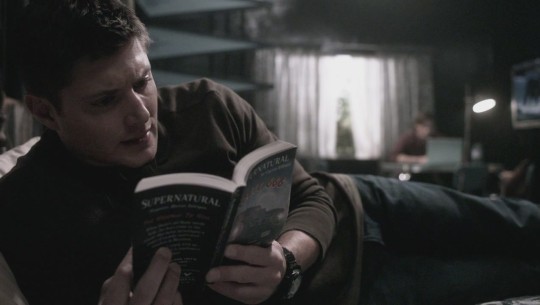
Oh, how I love this one. "Monster" is the introduction to the meta episodes where the Winchesters discover that they are main characters in a series of novels called "Supernatural," written by hack writer Chuck Shurley. As I said in my write-up of "Baby," it's taking radical chances with the narrative while continuing to stick closely to the show's mythology that makes Supernatural special.
And wow, this episode is special. Clever and funny and full of geeky in-jokes (especially the boys' disgusted discovery of the existence of Winchester slash), there is also that foundation of tragedy that makes it all work. The brothers cannot escape their fate. It's in the Winchester Gospels. – Billie Doux
2. "Changing Channels" (season 5, episode 8)
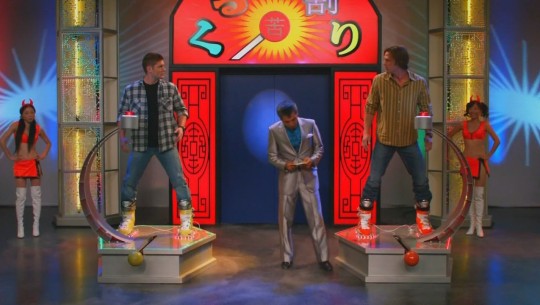
Take a beloved character, mix in playful jabs at some of the most popular TV shows while both expanding the narrative and laying the fate of the world on the interpersonal relationship of our favorite brothers. No wonder it’s one of the show’s creator, Eric Kripke’s favorite episodes. We discover the Trickster we’ve grown to know and love is none other than the Archangel Gabriel, little brother to Michael and Lucifer. Now that the Winchester’s have given Michael and Luci the Earth on which to wage their civil war, Gabriel is eager to see it end no matter the cost.
This doesn’t mean he can’t have fun doing it. Between the sitcom Supernatural’s opening credits, Dean fangirling over Dr. Sexy, Sam and the literal nutcracker, and the meta nod to Jeffrey Dean Morgan’s portrayal of a ghost on certain Seattle based medical show that shall remain nameless, we are treated to a host of laugh out loud moments. My personal favorite was Sam’s less than ecstatic performance in a genital herpes commercial. – Shari
"Nutcracker!!!!"
1. "Mystery Spot" (season 3, episode 11)
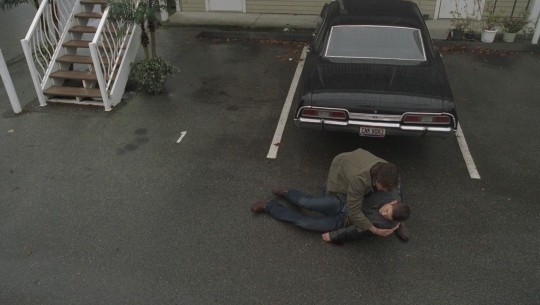
There’s something both twisted and poignant about watching Dean die again and again. Funny in a macabre way, for sure but also a touch tragic because in the Supernatural verse, those deaths were real. Well, real in that each was recorded, and each time he went to heaven briefly. No wonder Death finds Dean fascinating and frustrating.
Of course, it was really Sam’s episode, dealing with the pain of watching his brother die again and again, and the numbness that came with it was palpable. To this day, in season fourteen this episode has been referenced. Pretty good impact for a generally comedic episode. – J.D. Balthazar
Conclusion (by Billie Doux)
Putting this list together made me want to rewatch the entire series, although with so many seasons, that's turned into a major commitment. You know, we could probably put together lists of our top ten best comic episodes, the ten most tragic, ten scariest, ten best angel episodes, ten best ghost episodes, and so on because with so many seasons, there's so much to choose from.
It's interesting that the Groundhog Day episode "Mystery Spot" turned out to be our number one, simply because most of us put it on our list. Is it yours? Is your favorite even on this list? Post it in the comments!
Billie Doux has been reviewing Supernatural for so long that Dean and Sam Winchester feel like old friends. Courageous, adventurous, gorgeous old friends.
#Supernatural#Dean Winchester#Sam Winchester#Castiel#Bobby Singer#Mary Wincchester#John Winchester#SPN#SPN300#Doux Reviews
6 notes
·
View notes